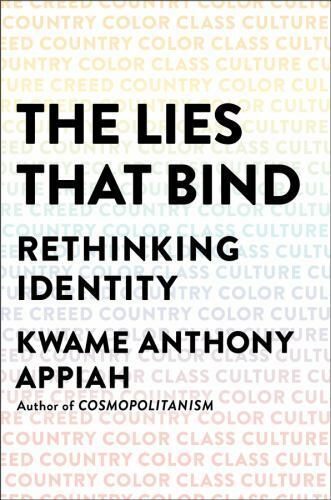I first came across Kwame Anthony Appiah’s The Lies That Bind: Rethinking Identity in a friend’s Instagram story and thought, “Hm, this would be an interesting book.” And it was, but not in the way I had been hoping for.
Appiah examines the broader concept of identities in an opening chapter (“Classification”) and then breaks down five specific ways that people typically identify—creed, country, color, class, and culture—before giving some end remarks (“Coda”). In each chapter he highlights the inherent instability of these concepts, not just through abstract supposition but also by pointing to historical events and people, like Italo Svevo or Amo Afer, as case studies.
Perhaps the book wasn’t for me because I was already on board with how unstable these categories are. I wouldn’t be able to name any specifics, but I imagine that Appiah’s arguments in places (maybe especially in the chapters on country and color) were also made in Nell Irvin Painter’s A History of White People, which meant that they weren’t new ideas for me. The chapter on creed also left me particularly underwhelmed—Appiah gives a thorough and convincing explanation of why religions are more than just adherence to a particular sacred text, but it seems to be in response to a shallow Internet atheist style interlocutor. Yes, that specific understanding of “religious creed” as an identifier is indeed a bit wobbly, but religion can be defined in other ways besides “adherence to a particular sacred text.” Those more nuanced understandings go largely unaddressed.
I think I also was going in half expecting a diatribe against what’s lately been termed “identity politics,” but Appiah never goes that far, either. He does raise skepticism about appeals to diversity within political parties or companies, but never more than mild commentary as an aside to the larger point. I went in spoiling for a good debate and instead got an explanation of things that more or less aligned with the views I already had.
Instead, the most engaging parts for me came in the initial Classification chapter, where Appiah sets out a working definition of “identity” for the book and where he thinks identities fail. In his view, identity markers are a rough shorthand for group assignations we can sometimes choose for ourselves and that we sometimes have foisted upon us. If I’m a Muslim, I have a very clear idea about what it means for me to be a Muslim. I also have a clear idea about it means for other people to be a Muslim. At the same time, other people have their own ideas about what it means for someone to be a Muslim. So far so good, if slightly chaotic. But because individual ideas about “being Muslim” will never coalesce into a universally accepted definition, things collide. I might consider myself Muslim while other Muslims do not; someone can also consider me a Muslim when I’m not in reality.
This kind of sloppiness might be surmountable or at least tolerable on its own, but identities run into another thorny problem: essentialism. By this Appiah is referring to the philosophical idea of “essences,” that people (or things, or animals, or etc.) possess immutable, timeless qualities. Mash this up with identity labels, and this means that we think of any given identity marker as arising from an eternal and immutable characteristic of the person with said identity. To continue on the Muslim example, people tend to think (or to act and speak as if they think) there is a Muslim-ness that all Muslims share, that it is an eternal and immutable thing. Essentialism, Appiah theorizes, works more or less fine for simple concrete things like cups or chairs, but it can’t hold for identities. There’s too much variation, even contradiction, within any one group.
But even though essentialism is presented as the single most important reason to rethink identity, it’s only addressed head-on in the introductory chapter. Appiah refers back to it occasionally in later chapters, but not in any strong sense. If illustrating the inherent instability of identity labels was meant to be the argument against essentialism, I don’t think it’s a very convincing one.
This might be a problem where I’m expecting popular philosophy, or popular political science, to dig into a topic at an academic level. That’s simply not the job of a popular book aimed at a lay reader and the problem is my own expectations. If a book like The Lies That Bind is meant to be an introduction that inspires readers to seek out more robust texts, or even just to reconsider their own ideas, then that’s fantastic no matter what I think of it. After all, The Lies That Bind is also an interesting and engaging read. Appiah has a knack for effective framing devices and clear, concise explanations. Perhaps the fact that the book grew out of lectures also helped give it a light, conversational tone.
As someone described How to be an Anti-Capitalist in the 21st Century, it’s a good book to give to your centrist friend. But if you’re already convinced of the instability of identity markers then there’s not much new here for you.

